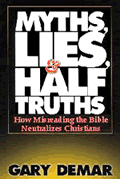Other Kjos Articles:
Harry Potter and The Postmodern Church
Popular Occultism and the Consensus Process
Legalized Mind Control Part 1Harry Potter And The Chamber of Secrets
Part 1
Hegelian Alchemy And
Mind Changing Games
Part 2
Pagan Fantasies Join The Digital Explosion
Part 3
The Global Message Behind Mystical
Thrills
EMERGING
"CHRISTIANITY"
WHO DEFINES THE KINGDOM OF GOD?
PART 3
By Berit Kjos
May 13, 2006
NewsWithViews.com
"What if Jesus' secret message reveals a secret plan?" asks Brian McLaren in his new book, The Secret Message of Jesus. "What if he didn't come to start a new religion--but rather came to start a political, social, religious, artistic, economic, intellectual, and spiritual revolution that would give birth to a new world?"[1-p4]
Nothing secret about that notion! That's what many believed back when Jesus first demonstrated His power among His people. But Jesus corrected them: "My kingdom is not of this world." (John 18:36)
Yet, emerging church movements today are still trying to move the boundaries of His Kingdom. They have redefined God's Word and are fast embracing the latest versions of the old Gnostic quest for secret knowledge (gnosis) and self-actualization, whether through mystical experience or collective imagination.
Stamping out faith in Biblical absolutes is central to this transformation. A mind anchored in God's Word won't compromise, but when that anchor is removed, the current of change can carry that mind anywhere. As Jesuit scholastic, Mark Mossa, wrote in his endorsement of Brian McLaren's latest book: "The Secret Message of Jesus challenges us to put aside our sterile certainties about Christ and reconsider the imaginative world of Jesus stories, signs and wonders."[1]
In this imaginative world, church leaders envision a spiritual oneness that must exclude God's "divisive" gospel and the "offensive" certainties that spawned its hope. What counts are 'deeds, not creeds'! Popularized by Rick Warren, this slogan paves the way for all religions to agree on the new terms. McLaren summarizes it well:
"...many Hindus are willing to consider Jesus as a legitimate manifestation of the divine... many Buddhists see Jesus as one of humanity�s most enlightened people.... A shared reappraisal of Jesus� message could provide a unique space or common ground for urgently needed religious dialogue.... This reappraisal of Jesus� message may be the only project capable of saving a number of religions."[1-p7]
Which man-made religions might be saved by this project? What about the first commandment: "You shall have no other gods before Me"? (Exodus 20:3)
Today's reappraisal of truth challenges us to examine this earthly "Kingdom of God" from the perspective of the Biblical Kingdom of God. Let's start with a look at our King.
1. A SOVEREIGN KING OR A UTOPIAN GUIDE
Growing up in Norway during the post-war years, I loved our human king. The tales of his kindness and courage during the Nazi occupation had inspired our nation, and he became my model for goodness and courage. Like him, I wanted to be brave enough to die rather than surrender to an enemy.
Years later I discovered that this heroic leader was nothing compared to my heavenly King. Yet my earthly king gave me a glimpse of approachable majesty that I continue to treasure. I began to see that we, the citizens of a heavenly Kingdom, resemble a nation of loyal subjects who -
-
love and obey their King
-
discover in their common goal and spiritual warfare a blessed fellowship that can rarely be found apart from pain and persecution
-
persevere -- without compromise -- to the end.
The world didn't welcome our true King, for "men loved darkness rather than light." [John 3:19] They didn't want a Savior who questioned their shallow delights and crushed their hope for an earthly kingdom. They despised his call to repentance, rationalized their own need for redemption, and ignored His message: "My kingdom is not of this world."
This wonderful King now reigns from His heavenly realm, yet is ever present in and with His own people -- those who are "crucified with Christ," filled with His Spirit," and delight in His Kingdom. [Luke 17:20]
"Enter by the narrow gate," He told us, for wide is the gate and broad is the way that leads to destruction, and there are many who go in by it." But "narrow is the gate and difficult is the way which leads to life, and there are few who find it." Matthew 7:13-14
2. UNIVERSALISM OR BIBLICAL CHRISTIANITY
Few choose His narrow ways these days. The world's superhighway looks far more enticing! Its deceptive blend of hopeful truths and deadly lies thrills the human nature, and McLaren's inclusiveness fits right in:
"...the kingdom of God will be radically, scandalously inclusive. As we�ve seen, Jesus enjoys table fellowship with prostitutes and drunks.... He affirms and responds to the faith of Gentiles�Romans and Syrophonecians and Samaritans."[1-p94]
No! Jesus never set aside His eternal laws in order to affirm other religions. Nor did he "enjoy" drunks and prostitutes. But He loved and forgave humble and repentant sinners. The apostle Paul illustrates this unmerited grace:
"Do you not know that the unrighteous will not inherit the kingdom of God? Do not be deceived. Neither fornicators, nor idolaters, nor adulterers, nor homosexuals, nor sodomites, nor thieves, nor covetous, nor drunkards, nor revilers, nor extortioners will inherit the kingdom of God. And such were some of you. But you were washed, but you were sanctified, but you were justified in the name of the Lord Jesus and by the Spirit of our God." 1 Corinthians 6:9-11
McLaren does mention "repentance." But he redefines it in terms that fit today's transformational process:
"This, by the way, is what the problematic word repentance is all about. The word means to rethink�to reconsider your direction and consider a new one, to admit that you might be wrong, to give your life a second thought, to think about your thinking."[1-p47]
Wrong in what way? By breaking God's law? Or by resisting the new inclusive thinking? The context suggests the latter, for the new view of the cross ignores God's moral laws and eliminates the need for genuine repentance.
Words such as "repent" or "rethink" now imply a willing rejection of the supposedly "narrow" Biblical thinking, which hinder planned change. The new thinking must be flexible, natural, and collective. Notice again how McClaren blends truth with lies:
"...what is the goal of this suffering sacrifice, this self-giving to the point of blood to achieve the Pax Christi? It is a new and lasting reconciliation between humanity and God, and among all the at-odds individuals and groups that comprise humanity. ... Paul said it like this: 'Old distinctions like Jew and Gentile, slave and free, male and female no longer exist, for you are all one in Christ.'... Today, he might speak of reconciliation.... Christians with Jews and Muslims and Hindus."[1-p99-100]
But Paul wrote his letter to Christians, not to unbelievers. His assurance of oneness "in Christ" applies only to those who have been joined to Jesus through the cross. "I am the way, the truth, and the life, said Jesus. "No one comes to the Father except through Me.'" John 14:6
3. MAN'S FINITE PURPOSE OR GOD'S ETERNAL PURPOSE
In spite of his call for radical inclusiveness, McLaren's earthly kingdom does exclude certain groups. The criteria for inclusion is the "new way of thinking" -- a phrase emphasized in UNESCO's 1995 report, "Our Creative Diversity." It tells us that "The challenge to humanity is to adopt new ways of thinking, new ways of acting, new ways of organizing itself in society, in short, new ways of living."[2] Compare that UN goal with McLaren's mission:
"A high fence that excludes everyone won�t do, nor will no fence at all. What we need is a requirement that those who wish to enter actually have a change of heart�that they don�t sneak in to accomplish their own agenda, but rather that they genuinely want to learn a new way of thinking, feeling, living, and being in 'the pastures of God.'� [1-p165]
"The kingdom of God, then, seeks a third way: not exclusiveness and rejection... but rather purposeful inclusion. In other words, the kingdom of God seeks to include all who want to participate in and contribute to its purpose, but it cannot include those who oppose its purpose."[1-p167]
Whose purpose? Since McLaren's whole message rests on man's imagination rather than God's unchanging Word, should we trust his "purpose?" No! [See Dealing with Resisters"]
McLaren isn't alone. "America's pastor" Rick Warren predicted "that fundamentalism, of all varieties, will be 'one of the big enemies of the 21st century.'"[3] He would probably agree with McLaren's criteria for citizenship:
"...to be truly inclusive, the kingdom must exclude exclusive people, to be truly reconciling, the kingdom must not reconcile with those who refuse reconciliation.... So what do you do? If you�re Jesus, you take whatever space you are given and let God�s kingdom be made visible and real there. ... And if critics see you as a transgressor and criticize you for opening the doors and expanding the boundaries, you go pursuing your purpose, making it clear that the kingdom of God is open to all, except those who want to ruin it by dividing it against itself."[1-p69-170]
4. AN EARTHLY KINGDOM OR A HEAVENLY HOPE
"Instead of being about the kingdom of God coming to earth," wrote McLaren, "the Christian religion has too often become preoccupied with abandoning or escaping the earth and going to heaven." [1-p78]
That may be true of some who call themselves Christian, but the faithful servants I know focus on fulfilling -- not escaping -- their God-given assignments here on earth. By His grace, they serve their beloved Lord wherever He sends them. And when their work on earth is done, they, like Paul, will delight in the Master's welcome: "Well done, good and faithful servant.... Enter into the joy of your Lord." (Matthew 25:23)
|
Subscribe to the NewsWithViews Daily News Alerts! |
"If then you were raised with Christ, seek those things which are above, where Christ is, sitting at the right hand of God. Set your mind on things above, not on things on the earth. For you died, and your life is hidden with Christ in God." Colossians 3:1-3
Click here for part -----> 1, 2,
Footnotes:
1,
Brian McLaren, The Secret Message of Jesus: Uncovering the Truth that
could change everything (Nashville: Thomas Nelson's W Publishing Group,
1006), page 4.
2,
Our Creative Diversity, UNESCO, 1995, p.11.
3,
Paul Nussbaum, "The
purpose-driven pastor," The Philadelphia Inquirer, January 8, 2006
Sign Up For Free E-Mail Alerts
E-Mails are used strictly for NWVs alerts, not for sale
Berit Kjos is a widely respected researcher, writer and conference speaker. A frequent guest on national radio and television programs, Kjos has been interviewed on Point of View (Marlin Maddoux), The 700 Club, Bible Answer Man, Beverly LaHaye Live, Crosstalk and Family Radio Network. She has also been a guest on "Talk Back Live" (CNN) and other secular radio and TV networks. Her last two books are A Twist of Faith and Brave New Schools. Kjos Ministries Web Site: http://www.crossroad.to/index.html
...emerging church movements today are still trying to...redefined God's Word and are fast embracing the latest versions of the old Gnostic quest for secret knowledge (gnosis) and self-actualization...











